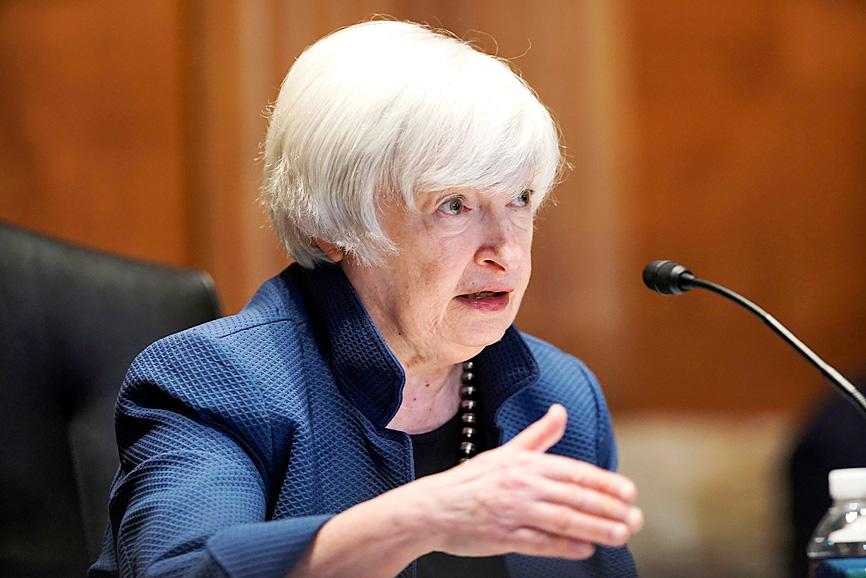US Secretary of the Treasury Janet Yellen is this week to urge her G20 counterparts for a global minimum corporate tax rate above the 15 percent floor agreed by 130 nations last week, but a rate decision is not expected until future phases of negotiations, US Department of the Treasury officials said on Tuesday.
The specific rate, and potential exemptions, are among issues still to be determined after 130 nations reached a historic agreement at a Paris-based Organisation for Economic Co-operation and Development (OECD) meeting last week.
The nations outlined a global minimum tax and the reallocation of taxing rights for large, highly profitable multinational firms.

Photo: Reuters
The deal is widely expected to be endorsed by G20 finance leaders when they meet on Friday and Saturday in Venice, Italy.
French Minister of the Economy and Finance Bruno Le Maire on Tuesday said that his G20 counterparts are poised to give political endorsement of the tax deal this week.
“We now must reach a political accord based on the technical agreement reached by the OECD steering group,” Le Maire told reporters.
Key details about a proposed global minimum corporate tax rate and exemptions from the agreement would then have to be cleared up before the next G20 meeting in October, he said.
However, negotiations on the global minimum tax rate are tied to the outcome of legislation to raise the US minimum tax rate, a US Treasury official said.
The administration of US President Joe Biden has proposed doubling the US minimum tax on corporations overseas intangible income to 21 percent along with a new companion “enforcement” tax that would deny deductions to companies for tax payments to nations that fail to adopt the new global minimum rate.
The officials said several nations were pushing for a rate above 15 percent, along with the US.
Yellen has been working with the tax-writing committees in the US Congress to include such provisions in budget “reconciliation” legislation, to align US tax laws with the new international tax goals.
Democrats in the US Congress have said they plan to pursue such legislation, expected to include new social program investments, and tax increases on US corporations and wealthy Americans, without Republican votes if necessary.
Republicans have vowed to fight any US tax increases.
The officials said the Treasury’s legislative proposals for reallocating taxation rights have been carefully crafted to appeal to both Democrats and Republicans.
The plans mark a shift from traditional headquarters-based taxation to allow nations where the largest and most profitable US firms sell products and services to tax a portion of those profits.
The Treasury would also be able to tax part of the profits of large foreign firms selling into the US.
The official said that the positives from the deal include ensuring no loss of US tax revenues and ending foreign nations’ digital services taxes aimed at US technology firms.
The official added that Yellen is also making clear that a potential new digital levy expected to be proposed by the European Commission to fund COVID-19 recovery is inconsistent with EU commitments to the OECD framework agreement signed on Thursday last week.
European Commission Executive Vice President Margrethe Vestager said that the levy would be paid largely by European companies to repay 750 billion euros (US$887 billion) in borrowing for a post-pandemic recovery fund.

Nvidia Corp CEO Jensen Huang (黃仁勳) today announced that his company has selected "Beitou Shilin" in Taipei for its new Taiwan office, called Nvidia Constellation, putting an end to months of speculation. Industry sources have said that the tech giant has been eyeing the Beitou Shilin Science Park as the site of its new overseas headquarters, and speculated that the new headquarters would be built on two plots of land designated as "T17" and "T18," which span 3.89 hectares in the park. "I think it's time for us to reveal one of the largest products we've ever built," Huang said near the

China yesterday announced anti-dumping duties as high as 74.9 percent on imports of polyoxymethylene (POM) copolymers, a type of engineering plastic, from Taiwan, the US, the EU and Japan. The Chinese Ministry of Commerce’s findings conclude a probe launched in May last year, shortly after the US sharply increased tariffs on Chinese electric vehicles, computer chips and other imports. POM copolymers can partially replace metals such as copper and zinc, and have various applications, including in auto parts, electronics and medical equipment, the Chinese ministry has said. In January, it said initial investigations had determined that dumping was taking place, and implemented preliminary

Intel Corp yesterday reinforced its determination to strengthen its partnerships with Taiwan’s ecosystem partners including original-electronic-manufacturing (OEM) companies such as Hon Hai Precision Industry Co (鴻海精密) and chipmaker United Microelectronics Corp (UMC, 聯電). “Tonight marks a new beginning. We renew our new partnership with Taiwan ecosystem,” Intel new chief executive officer Tan Lip-bu (陳立武) said at a dinner with representatives from the company’s local partners, celebrating the 40th anniversary of the US chip giant’s presence in Taiwan. Tan took the reins at Intel six weeks ago aiming to reform the chipmaker and revive its past glory. This is the first time Tan

CUSTOMERS’ BURDEN: TSMC already has operations in the US and is a foundry, so any tariff increase would mostly affect US customers, not the company, the minister said Taiwanese manufacturers are “not afraid” of US tariffs, but are concerned about being affected more heavily than regional economic competitors Japan and South Korea, Minister of Economic Affairs J.W. Kuo (郭智輝) said. “Taiwan has many advantages that other countries do not have, the most notable of which is its semiconductor ecosystem,” Kuo said. The US “must rely on Taiwan” to boost its microchip manufacturing capacities, Kuo said in an interview ahead of his one-year anniversary in office tomorrow. Taiwan has submitted a position paper under Section 232 of the US Trade Expansion Act to explain the “complementary relationship” between Taiwan and the US